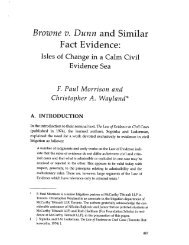The Doctrine of Public Policy in Canadian Contract Law
The Doctrine of Public Policy in Canadian Contract Law
The Doctrine of Public Policy in Canadian Contract Law
You also want an ePaper? Increase the reach of your titles
YUMPU automatically turns print PDFs into web optimized ePapers that Google loves.
<strong>The</strong> <strong>Doctr<strong>in</strong>e</strong> <strong>of</strong> <strong>Public</strong> <strong>Policy</strong> <strong>in</strong> <strong>Canadian</strong> <strong>Contract</strong> <strong>Law</strong> 13<br />
judicial attitude towards public policy is found <strong>in</strong> the observation <strong>of</strong>Lord Davey<br />
<strong>in</strong> Janson v. Driefonte<strong>in</strong> Consolidated M<strong>in</strong>es Ltd. that "public policy is always<br />
an unsafe and treacherous ground for legal decision..."12 Indeed, some courts<br />
have even gone so far as to state that "[a} series <strong>of</strong> decisions based upon grounds<br />
<strong>of</strong> public policy, however em<strong>in</strong>ent the judges by whom they were delivered,<br />
cannot possess the same b<strong>in</strong>d<strong>in</strong>g authority as decisions which deal with and<br />
formulate pr<strong>in</strong>ciples which are purely legal.""<br />
Despite be<strong>in</strong>g held <strong>in</strong> such low regard, it has generally been acknowledged<br />
that public policy is a necessary correlate to the rule <strong>of</strong> law.'4 Although it is<br />
beyond the scope <strong>of</strong> this paper to enter <strong>in</strong>to a detailed discussion <strong>of</strong> the various<br />
justifications for the doctr<strong>in</strong>e," it appears beyond dispute that some concept<br />
equivalent to public policy is required to supplement the express restrictions on<br />
human activity which have become codified <strong>in</strong> statute and precedent. As recognized<br />
more than a century ago by Holmes, considerations <strong>of</strong> public policy<br />
are "the secret root from which the law draws all the juices <strong>of</strong> life. . . Every<br />
important pr<strong>in</strong>ciple which is developed by litigation is <strong>in</strong> fact and at bottom the<br />
result <strong>of</strong> more or less def<strong>in</strong>itely understood views <strong>of</strong> public policy"."<br />
One <strong>of</strong> the most <strong>in</strong>terest<strong>in</strong>g manifestations <strong>of</strong> public policy is its status as<br />
a doctr<strong>in</strong>e <strong>of</strong> law that is capable <strong>of</strong> nullify<strong>in</strong>g the validity <strong>of</strong> private agreements.17<br />
12 [1902] A.C. 484 (H.L.) at 500 [Janson]. One author writes "[w]hy, then, have the modern<br />
rules <strong>of</strong> public policy developed as they have and, more curious, survived What is clear<br />
is that it is not because <strong>of</strong> judicial affection. Where applied they are <strong>of</strong>ten accompanied<br />
by expressions <strong>of</strong> distaste... Indeed the judges on occasion express a sense <strong>of</strong> achievement<br />
on hav<strong>in</strong>g avoided the application <strong>of</strong> the rules <strong>of</strong> public policy..." (John Shand, "Unbl<strong>in</strong>ker<strong>in</strong>g<br />
<strong>The</strong> Unruly Horse: <strong>Public</strong> <strong>Policy</strong> In <strong>The</strong> <strong>Law</strong> <strong>of</strong> <strong>Contract</strong>", [1972] Cambridge L.J.<br />
144 at 158 [Shand]).<br />
13 Nordenfelt v. Maxim Nordenfelt Guns & Ammunition Co., [1894] A.C. 535 (H.L.) at 553.<br />
14 See, e.g., Egerton v. Earl <strong>of</strong> Brownlow (1853), 4 H.L.C. 1 (U.K. H.L.) at 197.<br />
15 See, <strong>in</strong> this connection, Shand, supra note 12, <strong>in</strong> which punitive, deterrent, "purity <strong>of</strong> the<br />
court" and "unclean hand" justifications for the doctr<strong>in</strong>e <strong>of</strong> public policy are exam<strong>in</strong>ed.<br />
16 Oliver Wendell Holmes, Jr., <strong>The</strong> Common <strong>Law</strong> (Boston: Little, Brown and Co., 1881) at<br />
35. See also A. v. Hayden (1984), 156 C.L.R. 532 (H.C.A.) at 558, stat<strong>in</strong>g that "the place<br />
<strong>of</strong> public policy <strong>in</strong> the formulation <strong>of</strong> the common law has been recognized by the greatest<br />
judges from early times." A comparable concept, known as "public order" is also recognized<br />
<strong>in</strong> the civil law: see, e.g., Articles 1411 and 1413 <strong>of</strong> the Civil Code <strong>of</strong> Quebec.<br />
17 It is important to appreciate that the role played by public policy <strong>in</strong> contract (and succession)<br />
law is not identical to the role which public policy plays <strong>in</strong> other areas <strong>of</strong> the law<br />
(such as torts or the conflict <strong>of</strong> laws). As noted by McHugh and Gummow J.J. for the<br />
High Court <strong>of</strong> Australia <strong>in</strong> Cattanach v. Melchior (2003), 215 C.L.R. I at para. 60,<br />
"'public policy' <strong>in</strong> relation to the common law <strong>of</strong> torts is not to be thought <strong>of</strong> as like that<br />
public policy which <strong>in</strong>validates contracts and, one might add, certa<strong>in</strong> trusts and conditions<br />
attached to voluntary dispositions by will or settlement. In those areas, the start<strong>in</strong>g po<strong>in</strong>t<br />
has been the favour with which the law has looked upon the right <strong>of</strong> private contract and<br />
the performance <strong>of</strong> contracts, and upon the freedom <strong>of</strong> disposition <strong>of</strong> property, by dispositions<br />
<strong>in</strong>ter vivos and testamentary." For a contrary view, see C.R. Symmons, "<strong>The</strong><br />
Function and Effect <strong>of</strong> <strong>Public</strong> <strong>Policy</strong> <strong>in</strong> Contemporary Common <strong>Law</strong>" (1977) 51 Austl.<br />
L.J. 185 at 185-186 [Symmons].
















